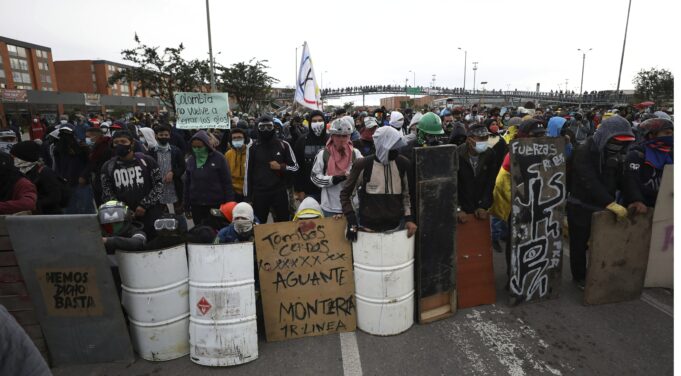BOGOTA, Colombia—Forty-two people have died during anti-government protests that began two weeks earlier amid discontent fueled by growing poverty and inequality during the pandemic, Colombia’s human rights ombudsman said.
The government agency added May 11 that 168 people had been reported missing during the protests, which were set continuing. On May 5, the human rights ombudsman said 24 people had been killed in the protests and 89 were missing.
The new figures from the ombudsman are similar to those recorded by Temblores, a non-governmental group that tracks police violence. Temblores said that 40 people had been killed during the protests in incidents related to police violence while one policeman was stabbed to death while trying to stop a riot.
Colombian police have been widely accused of using excessive force to break up demonstrations and riots that started April 28 after the government attempted to increase taxes in what it said was an effort to reduce its deficit and raise funds for health care and social services.
The government withdrew its $6.7 billion tax plan May 2 and the finance minister resigned the following day, but protests have continued across the country. Demonstrators are now pressing demands that include reforming the police, implementing a basic income plan for 10 million people and providing free tuition at public universities.
Colombia’s economy contracted seven percent last year and millions of people were left without work by restrictions related to the pandemic. That increased frustration with the government, which had failed to meet demands made during a previous wave of protests in 2019.
On May 10, the government’s peace commissioner, Miguel Ceballos, said President Ivan Duque’s administration was willing to sit down with protest leaders to negotiate on some of their demands. Mr. Ceballos asked the United Nations and the Roman Catholic Church to mediate the talks.
The protest leaders met with government officials and said that basic conditions for negotiations, such as security guarantees for protesters, had not been met. Protest leaders are expected to respond to the government’s new offer soon.
The protests are being staged as coronavirus infections reach record levels in Colombia, where more than 78,000 people have died from Covid-19, the disease that can be caused by the virus. Over the one recent week Colombia has averaged more than 15,000 new infections a day. The current rate of infections is five times greater than at the beginning of March.
Thousands of Colombians who have protested across the country against a government they feel has long ignored their needs, allowed corruption to run rampant and is so out of touch that it proposed tax increases during the coronavirus pandemic.
Despite virus lockdown orders, protesters turned out in more than half of Colombia’s municipalities for mostly peaceful protests against the administration of President Duque.
The protests started on April 28 over proposed tax increases on public services, fuel, wages and pensions, but morphed into a general demand for the government to pay longstanding debts to the most vulnerable in society, such as Indigenous and Afro Latino people. Even though the administration withdrew the tax reform, protest continued and grew as reports emerged of police violence, deaths and disappearances.
Activists see a link between the current protests and demonstrations in November 2019 over a host of issues: earlier tax increases, the murder of social leaders, official corruption, inequality and compliance with a peace agreement that led to the 2016 demobilization of the Revolutionary Armed Forces of Colombia.
The discontent expressed in 2019 festered throughout the coronavirus pandemic as people saw their livelihoods disappear, their friends and family members die of Covid-19 and the government struggle to respond. Their anger spilled again onto the streets.
Protesters have at times erected roadblocks that officials say have led to food shortages, prevented vaccine deliveries and blocked ambulances.
Defense Minister Diego Molano said security forces have tried to protect those who are peacefully demonstrating as well as those who chose to stay home.
The military has sometimes joined police since President Duque on May 1 signed off on armed forces’ involvement until “the acts of serious alteration of public order cease.” That allows mayors to request the army’s presence in urban areas—a move questioned by human rights observers.
“International (human rights) standards require limiting as much as possible the use of the (military) to control internal disturbances. The soldiers are trained for armed conflict, not for citizen security,” said José Miguel Vivanco, director for the Americas at Human Rights Watch.
The government contends that rebel groups have infiltrated protests and drug-trafficking enterprises are subsidizing demonstrations. President Duque even classified the actions as “low-intensity terrorism.”
However, leaders of the demonstrations say security forces have been exceedingly violent and the government is stigmatizing protesters.
The epicenter of the demonstrations as well as the violence has been the southwestern city of Cali, where movements of peasants and Indigenous and Afro Latino people converge. In Cali, there is a “historical accumulation of social discontent, anger and rebellion,” said sociologist Rosembert Ariza at the National University of Colombia.
“It is a politically cultured city, and it may sound contradictory, but the exercise of violence is nothing but the response to the violence they are receiving.”
International observers have called on President Duque’s government to respect human rights and guarantee people’s right to protest.
Martha Hurtado, spokeswoman for the United Nations High Commissioner for Human Rights, said the organization is “deeply alarmed” because it received information that in Cali the “police opened fire on protesters protesting the tax reform, killing and wounding several people.”
The Colombian agency responsible for monitoring human rights compliance earlier reported 26 people were killed in protests, including a police officer. The agency did not specify the number of deaths in which police have been involved. Previously, the agency alleged police involvement in a dozen.
Meanwhile, the mayor’s office in Bogota, Colombia’s capital, reported that protesters “tried to burn alive” 10 police officers on May 4.
(Compiled from Associated Press reports.)













